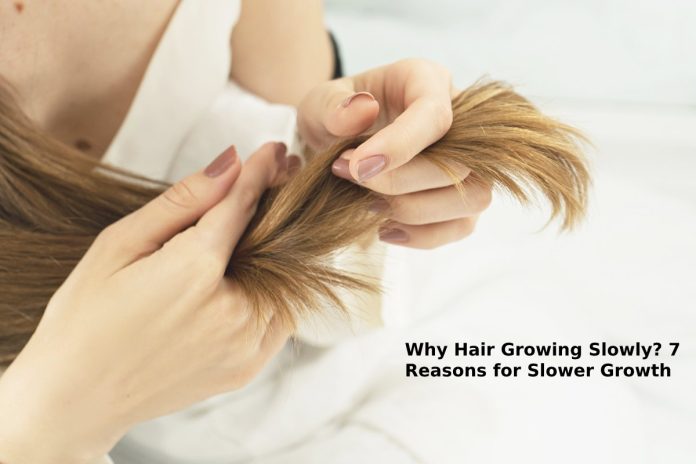Growth
Many people want long, flowing hair. Or, at the very least, hair that grows at a fast enough rate to help fight damage.
Whatever your reason for wanting fast hair growth, you may sometimes wonder if something is going on that is preventing your hair from growing as quickly as possible.
It turns out that some things can happen during this cascade or stop your hair’s growth potential.
Next, we will cover seven reasons why your hair growth can look stunted.
Also Read: Everything Need to know about CBD Skincare
7 Reasons Why your Hair Growth can Look Stunted
Androgenetic alopecia (male or female hair loss)
Your stunted growth may be due to a genetic condition such as male or female baldness.
Both of these situations tend to come from genes you inherited from your family and can ultimately lead to the loss or shrinkage of hair follicles that stop producing hair, or strands can only grow for a time before they fall out.
But, just because these hair loss patterns are genetically based, it doesn’t mean that there is nothing you can do about it.
You can talk with your doctor in person or request a telemedicine hair loss consultation to see if medications such as minoxidil, finasteride, dutasteride, or spironolactone may be a good option for your androgenetic alopecia.
Lack of Proper Nutrition for Growth
Your body needs many vitamins, minerals, calories, and protein to function at its best, as does hair growth.
Hair is mainly prepare for protein, so if your diet lacks many healthy protein sources, your body may not be getting enough to support rapid hair growth.
The same goes for vitamins and minerals. An extensive variety of fruits and vegetables help provide vitamins and antioxidants to nourish hair follicles and maintain rapid growth.
If you are not giving your body what it needs for optimal growth, you may start to see thinner and more delicate strands, and your growth rate may suffer.
About Styling or Hair Treatment
What does styling and straightening the middle and ends of the hair have to do with how fast the hair grows?
Good much.
It is probably severely damaged when your hair is subject to many heat styling tools, bleaching, coloring, or perming treatments.
And while it doesn’t slow scalp growth on its own, damaged hair is much more likely to break and split. This break makes it difficult to increase the total length of your hair because it does not hold at this point. With the help of the RM365 hair treatments, you can protect your hair from damage.
Healthy Conditions
Specific health problems can be accompanied by changes in the growth rate of your hair, and drastic changes in your hair can be a sign that something else could be going on.
Thyroid conditions, polycystic ovary syndrome, cancer, high blood pressure, and depression are just a few of the common conditions that can negatively affect your hair.
Hormonal Changes
Hormonal changes are a reality. Whether you’re getting older, going through menopause, having a baby, or starting or stopping hormonal contraception, your hormones can have a straight impact on the health and strength of your hair.
Hair loss or slower growth can result from a drop in your hormones, such as with age, menopause, or after childbirth. Still, fluctuations can also cause hair changes, such as constant tightening of your hair. . Contraception, hormone replacement therapy, or a continuous lack of doses of hormonal medicines.
With hormonal conditions like PCOS, women have complex testosterone levels in their body than usual, causing hair follicles to shrink and growth to slow due to excess DHT.
You don’t have Enough Cuts
Cutting your hair more regularly when you want it to get longer seems counterintuitive, but hear us out.
The ends of our hair are usually the most damaged parts of our hair.
This means the longer you go without a cut, the more likely you are to face a buildup of split ends there.
Split ends, if left unattended, can continue to split and pull up the strand, which could cause it to break higher.
If you have enough split-ends breaking off, your entire length of hair may appear stagnant or grow slower than if you had cut those ends regularly.
Your scalp is not happy!
After all, your hair follicles live on your scalp, so if your scalp is red, itchy, dry, scaly, or clogged with oil and products, it won’t live up to its growth potential.
Retain your scalp clean and healthy by washing your hair habitually, avoiding product buildup, and treating circumstances like dandruff before they have a chance to affect hair growth.


















